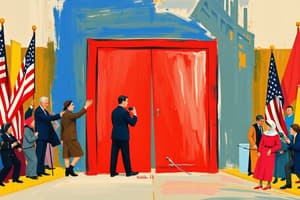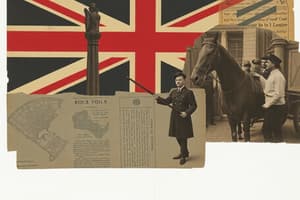Podcast
Questions and Answers
What was the name of the U.S. foreign policy initiative that aimed to ensure equal access for all nations to trade within China?
What was the name of the U.S. foreign policy initiative that aimed to ensure equal access for all nations to trade within China?
Open Door Policy
What event that led to the Spanish-American War was used as propaganda to generate public support for the war?
What event that led to the Spanish-American War was used as propaganda to generate public support for the war?
The sinking of the USS Maine
Which of the following is an example of a natural resource that Theodore Roosevelt felt was important to conserve?
Which of the following is an example of a natural resource that Theodore Roosevelt felt was important to conserve?
What was one of the main reasons the U.S. became involved in Latin America in the late 19th and 20th centuries?
What was one of the main reasons the U.S. became involved in Latin America in the late 19th and 20th centuries?
Signup and view all the answers
What were the main goals of Theodore Roosevelt's "Square Deal"?
What were the main goals of Theodore Roosevelt's "Square Deal"?
Signup and view all the answers
What was the main reason for the establishment of the "Open Door Policy"?
What was the main reason for the establishment of the "Open Door Policy"?
Signup and view all the answers
Which of the following best describes the "Big Stick Policy"?
Which of the following best describes the "Big Stick Policy"?
Signup and view all the answers
Which of the following best summarizes the perspective of President Theodore Roosevelt concerning natural resources?
Which of the following best summarizes the perspective of President Theodore Roosevelt concerning natural resources?
Signup and view all the answers
What was the main purpose of the "Open Door Policy"?
What was the main purpose of the "Open Door Policy"?
Signup and view all the answers
What was the main goal of President Theodore Roosevelt's "Big Stick Policy"?
What was the main goal of President Theodore Roosevelt's "Big Stick Policy"?
Signup and view all the answers
What was the main reason for the U.S. decision to build the Panama Canal?
What was the main reason for the U.S. decision to build the Panama Canal?
Signup and view all the answers
What was the slogan used by Woodrow Wilson in his 1916 reelection campaign?
What was the slogan used by Woodrow Wilson in his 1916 reelection campaign?
Signup and view all the answers
The U.S. practiced neutrality during World War I, not taking sides in the war.
The U.S. practiced neutrality during World War I, not taking sides in the war.
Signup and view all the answers
Study Notes
U.S. Global Involvement/Imperialism
- Between 1890s and 1914, the U.S. expanded its access to overseas markets and raw materials through imperialism.
- Imperialism is a policy of extending a country's rule over foreign countries through military and economic control.
Reasons for Imperialism
- Increased American industry (businesses and factories) in the 1800s created a need for raw materials and new markets.
- Dollar diplomacy aimed to increase U.S. influence in Latin America by using financial power.
- Economic nationalism prioritized the U.S. domestic economy over the global economy using protective tariffs (taxes on foreign products).
Protective Tariffs
- These tariffs made foreign products more expensive so consumers would buy American goods.
Open Door Policy (1899-1900)
- Introduced by Secretary of State John Hay.
- Ensured equal trade access for all nations in China.
- Prevented any single power from establishing a monopoly on Chinese markets.
- Protected China's territorial integrity.
- U.S. sought to protect its own trade interests.
Spanish-American War (1898)
- Yellow journalism (propaganda/lies) by Joseph Pulitzer and William Randolph Hearst fuelled public support.
- The sinking of the U.S.S. Maine in Havana Harbor was a catalyst.
- The U.S. built the Panama Canal, a waterway connecting the Atlantic and Pacific Oceans.
- This shortened travel time and increased trade/military efficiency.
- The U.S. gained overseas colonies, becoming a world power.
Theodore Roosevelt's Policies
- New Nationalism: Domestic policy to address industrialization's problems.
- The Square Deal: Focused on conservation of natural resources, corporate regulation, and consumer protection (3 Cs).
- Trustbusting: Aimed to break up monopolies that restricted competition.
- Big Stick Policy: "Walk softly, but carry a big stick" to intervene in Latin America. U.S. would use force if necessary.
Woodrow Wilson's Policies
- New Freedom: Aimed to reform the American economy and government system by combating big business and defending small businesses.
- Neutrality: Initial stance in World War I.
- Federal Reserve System: Created to regulate the money supply.
Other Key Information
- The U.S. annexed Hawaii and the Philippines during this period.
Studying That Suits You
Use AI to generate personalized quizzes and flashcards to suit your learning preferences.
Related Documents
Description
Explore the era of U.S. imperialism from the 1890s to 1914, focusing on the motivations behind expansionism and the policies implemented, such as the Open Door Policy. This quiz covers the economic factors that propelled the U.S. into global markets and the consequences of protective tariffs.




